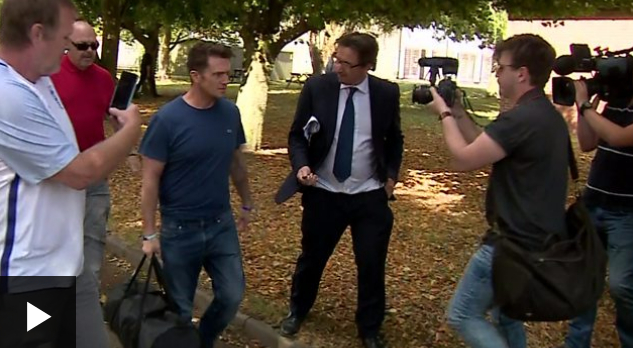Outcome of “Tommy Robinson” appeal: phony anti-establishment martyr, phony “far right” threat agitation
And so the “Tommy Robinson” hot shot legal team, engaging the Queen’s Counsel Jeremy Dein – only the top criminal defence lawyer in the country – has won a new hearing for their main manǂ. There will be a re-examination of his contempt of court conviction as handed down at Leeds in May. Very basically, the main issue by which this judgement came unstuck was the apparent fact that the precise nature of the contempt was not identified and put to “Robinson” – secondarily, no adjournment was made, and thus no opportunity was available to gain clarification. Such are the fundamentals as the author understands them. This procedural error overrode the admission of guilt that “Robinson” had made. The appeal court found nothing wrong in the matter of the contempt of court conviction handed down to “Robinson” at Canterbury in 2017.
It has to be said, the previous article at FBEL covering the “Tommy Robinson” appeal (The “Tommy Robinson” arrest psyop: the appeal, the con – and Leveson II?) suffered from taking the Rebel Media and Ezra Levant at their word – a big mistake that shouldn’t have been made around these parts, although in mitigation it was stressed that the FBEL analysis depended on the resource material being true.
However, if we wait a bit longer, we might yet find that some key statements in that FBEL piece will be justified:
There is a case to make, then, that this appeal will not actually achieve anything, and if this is true then the question needs to be asked: for what real purpose is it being made?
…what we might expect to see happen will resemble the following: “Robinson’s” appeal politely declined, but not before an advocate for new legislation to regulate the internet is given a prominent platform to espouse his views.
For it appears that just because “Robinson” has won an appeal, it doesn’t mean that there is a total victory in the offing.
Look at the following extract from the Court of Appeal’s ruling, the Right Honourable the Lord Burnett of Maldon, the Honourable Mr Justice Turner, and the Honourable Mrs Justice McGowan presiding, 1st August, 2018. It comes from paragraph 64; we’re going to chop it up to deal with it in smaller strings of data.
It is tolerably clear from the transcript that the thrust of the complaint against the appellant was that he had acted in breach of the section 4(2) postponement order.
Mentioned here is the transcript of the proceedings at Leeds where the now quashed conviction of “Robinson” took place; it appears from what was said that there was perception of a concept of “Robinson” being in contempt. This is significant, because in a hearing which does not suffer from procedural flaw, this will be brought to bear. Now consider this:
During the course of his submissions Mr Dein QC accepted that the transcript of his client’s broadcast suggested that he had indeed acted in breach of this order in several respects.
This is about “Robinson’s” own hot shot lawyer, in his dealings with the Court of Appeal, failing to dispute that “Robinson”, during the diatribe performed outside of Leeds Crown Court, was in breach of the previous court order wherefor a prison sentence had been suspended [CORRECTION, 13/8/18: the order referred to is the postponement order (reporting restrictions) applied to the trial at Leeds Crown Court. However, if “Robinson” has been in breach of these, and therefore in contempt, he is also in breach of his suspended sentence].
The rest of the paragraph gets to the real meat:
It is entirely unclear what aspects of the video the appellant, through his counsel, was accepting amounted to contempt in that regard. However, in his sentencing remarks the judge [i.e. Marson at Leeds] made specific reference to the appellant’s generic comments during the course of his broadcast about his perception of the role of religion and ethnicity in offending of the nature alleged in the case in progress. Doubtless, these comments were, at least potentially, capable of amounting to a free-standing contempt of court but they were not in any sense a report on the proceedings themselves.
At the end is the crucial matter; particular comments by “Robinson” potentially constitute contempt of court: presumably the Appeal Court must be careful in its wording because it will be up to the new hearing to examine “Robinson’s” activity. But what do we expect to happen if the UK’s leading criminal defence lawyer won’t deny that “Robinson” has been in breach of a previous suspended sentence? Here’s what the so-called “Secret Barrister” blogger, someone who has been explaining this case to a mainstream audience, has to say on the matter:
The [Appeal] Court remitted (sent back) the contempt for a fresh hearing at the Crown Court before a different judge. When the contempt is established… he will be sentenced afresh.
The “Secret Barrister” was not the only one to notice the “sting in the tail” of the Appeal Court’s ruling – take a look yourself, dear reader, with emphasis added:
78 Mr Dein QC submitted that since the appellant has served the equivalent of four months’ imprisonment the matter should not be remitted. We are unable to agree. First, the alleged contempt was serious and the sentence might be longer than that already served if a finding is again made against the appellant, particularly having regard to the suspended committal order made at Canterbury. Secondly, and in any event, a determination of the underlying contempt allegations in the circumstances of this case is in the public interest.
The emphasised sentence should be self-explanatory. The other important detail is the stress placed on justice being seen to be done in the new hearing. It is a good bet that there is a concern amongst these Appeal Court judges that stems from the exploitation of this case, by certain parties, to provoke feelings of outrage in large portions of the population who use their brains to sit on.
At this stage of the affair, the author is of the opinion that in this psyop – which is what it is – there is not necessarily a corrupt court scenario – meaning that the State hasn’t put “Robinson” through a show trial which it manages in every detail in order to bring about a desired result for a particular agenda. In the UK, if you look for it, there is still a functioning streak in the legal system that is entirely serious about law; it begins at your small claims court, and you can follow it upwards. It may well get made an ass by Law Lord rulings – which is the author’s experience – or bad legislation, but it will never produce the entirely spurious results that have emanated from the theatre that has taken place at Woolwich Crown Court (please see the case of Darren Osborne), but mostly the Old Bailey (Thomas Mair, Michael Adebowale and Michael Adebolajo, Ahmed Hassan). It now appears to be the case, in the author’s opinion, and considering the evidence available to him, that “Tommy Robinson” has been pitted against the run of the mill legal system, and against judges who are concerned for the integrity of the cases that they have a responsibility for. On the other hand, the appeal certainly produces a concrete impression of Stephen Yaxley-Lennon having been in prison, does it not?
In any case, there is game being played in front of a public dismayed by it (one way or another) of “Robinson” versus the Judges, and therefore the “Establishment”, and its purpose is clearly to foment trouble. Additionally, those behind it are spending a vast amount of money on it. The reader probably doesn’t know what it costs to retain a QC. The author does, because he came up against one in a county court hearing (the local law firm representing the other party found that it had to retain the services of a QC, plus entourage of juniors/interns – whatever). The rate was £1000 per hour.
Now consider the following extract, from the Appeal Court decision, paragraphs 52 and 54. The background information the reader needs to know is that “Robinson” appears to have requested a (late) appeal against the Canterbury hearing (the one in 2017 where he was handed the suspended sentence) on the same grounds of not understanding the nature of the contempt. The Appeal Court appears to be in possession of material that shows that a failure of “Robinsons” defence team at his Canterbury hearing to indicate any lack of understanding was deliberate:
52 No complaint was made at the adjourned hearing by the appellant’s legal team that there was any lack of clarity about the nature of the allegations which he faced. Indeed, from late disclosure made to this Court four days after the hearing of this appeal, it has now come to light that a deliberate tactical decision was made by the appellant’s legal advisers at Canterbury to be complicit in the court’s failure to comply with Rule 48.
The ruling then cites some material, which, by the comments in paragraph 52, we must deduce come from “Robinson’s” defence people at Canterbury [in fact, we don’t have to deduce. Evidently, if an appellant to the Court of Appeal waives legal privilege, which Team “Robinson” did, then the court has access to legal advice given to the appellant in the case being appealed]. The following constitutes the key portions:
Part of the responsibility for the vagueness of the allegations lies with us, and was deliberate. We knew that spelling out the allegations clearly would not be entirely straightforward for the judge, and that she might not have had the opportunity to give sufficient thought to the details of the contempt hearing…
If we had been more insistent that she properly spell out the specific actions that she proposed to find as contempt, she probably would have done so – and we would have been in a worse position as her sense of unease would have subsided.”
The Appeal Court judgement then goes on to cite a rule whereby a court is to be made aware of any procedural error if it be known by parties to the case, and thus:
54 It lies ill in the mouth of an appellant to complain of the failure of the court below to follow the appropriate procedural steps when that failure was fully appreciated at the time and remained deliberately uncorrected for tactical reasons and collateral advantage. We ought to record that counsel representing the appellant on this appeal were unaware of this advice at the time of making their oral submissions and was disclosed promptly when it came to their attention.
If the reader remembers, all the usual suspects around “Robinson” made a big deal of the fact that the legal team that he usually retained could not administer to him at Leeds†. We’ve already discussed hereabouts the fact of a “Save Tommy” website domain name existing before it was needed (see the article mentioned above) indicating that “Robinson” may have been present at Leeds to trigger an incident. Does it begin to look like “Robinson” was set up at Canterbury for another appearance in court, and did it all go wrong when Judge Marson hauled him over the coals too fast before his legal cronies, who it appears may well have been entirely familiar with the technicalities by which a case against a contemnor would fall through, couldn’t attend to represent him in time? On the other hand, the actual jailing of “Robinson” has been incredibly productive for motivating a left-right battlescape; it’s entirely possible that it was an objective, aided by the fact that Marson, like the judge at the Canterbury hearing (meaning it might not be unusual, and thus it was a phenomena to be counted on), was not au fait with the procedural small print. The Appeal Court judgement said that “Robinson” should not have been jailed – it will therefore, no doubt, be used as fuel to provocateurs to promote the notion of “Robinson” as a martyr.
On the other side‡, there is this sort of thing from Owen Jones (via a tweet):
Convicted fraudster Tommy Robinson is out of jail, and the far right have their Oswald Mosley figure. The far right are on the rise, the mainstream media are going to keep legitimising them and making them respectable – so it’s up to the rest of us to fight back.
Of course, at the fundamental level, it’s all to do with the totally specious, manufactured fight between the “far right” and the good guys with their socialism, and world government, and their desire to extinguish dissent – and this is not a reference to the straw man social media where the likes of “Robinson” are deployed to create an idea that internet platforms enforcing their own policies signifies the end of free speech; i.e. an idea that corporate-government internet platforms are the only avenues of free expression.
In any case, although we have a good idea of what is ahead (and therefore what grist to the mill there will be for provocateurs on all sides) we await the next instalment in the “Tommy Robinson” arrest pysop.
† This is from the “Secret Barrister” website, May 2018, who was responding to a “conspiracy theory” that was doing the rounds on social media, to wit: “I heard that Tommy Robinson was denied his own lawyer, and had to have a duty lawyer who was in fact a PROSECUTION lawyer and who didn’t properly defend him”.
The barrister previously instructed by Yaxley-Lennon has confirmed that she was not present at court for these proceedings. She is understandably declining to comment further unless or until authorised to do so. But in any case, Yaxley-Lennon was defended by an experienced member of the independent criminal Bar. He may have been offered the duty solicitor at the police station if his chosen solicitor was not available, but in the Crown Court hearing he was advised and represented by a specialist criminal barrister with over 16 years of experience of cases including murder, people-trafficking, serious violence and serious sexual offences.
‡ Here’s evidence of the operation on the “right” side. Stefan Molyneux, a usual suspect, tweets blatant disinformation to reinforce the conviction held by Cult of “Robinson” adherents that their man is a victim.
They arrested him. They immediately jailed him. They silenced media coverage. They lost the court appeal. Tommy Robinson did nothing wrong.
And here is a great example of what this psyop, and the underlying promotion of National Action, is also being used for at what is a critical time in British history: deterring escape from the well established political plantations. The Guardian writes…
Far-right activists and anti-immigration campaigners around the world have welcomed the release of Tommy Robinson.
Obviously, all anti-immigration campaigners are not racists (which is what “far-right” is code for) – and yet here they are lumped together. The objective of this linguistic programming, off of the back of the “Tommy Robinson”/National Action psyop, is to make people who identify by the fake political spectrum, and think of themselves to be “of the left”, have a conditioned knee-jerk reaction over issues of national sovereignty and immigration based of a preconception fed to them by Government. These people may have concerns about immigration themselves, but they are deterred from exploring them, and definitely from expressing them, because of the stigma attached to the ideas.
ǂ The Appeal Court ruling to be found here: R v Stephen Yaxley-Lennon (aka Tommy Robinson)
Also for the record:
“‘Tommy Robinson” leaving Onley Prison”, 1st August, 2018
A close up
“Tommy Robinson” at the time of his arrest, 25th May, 2018




















